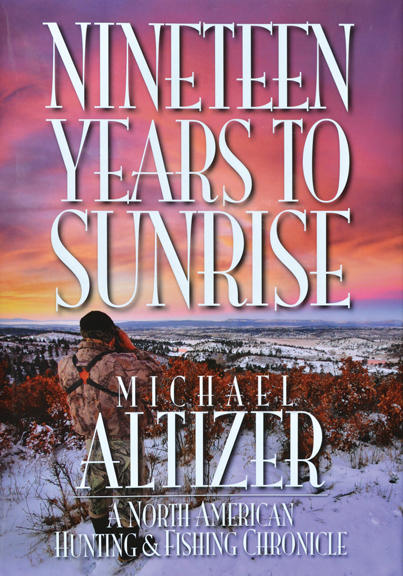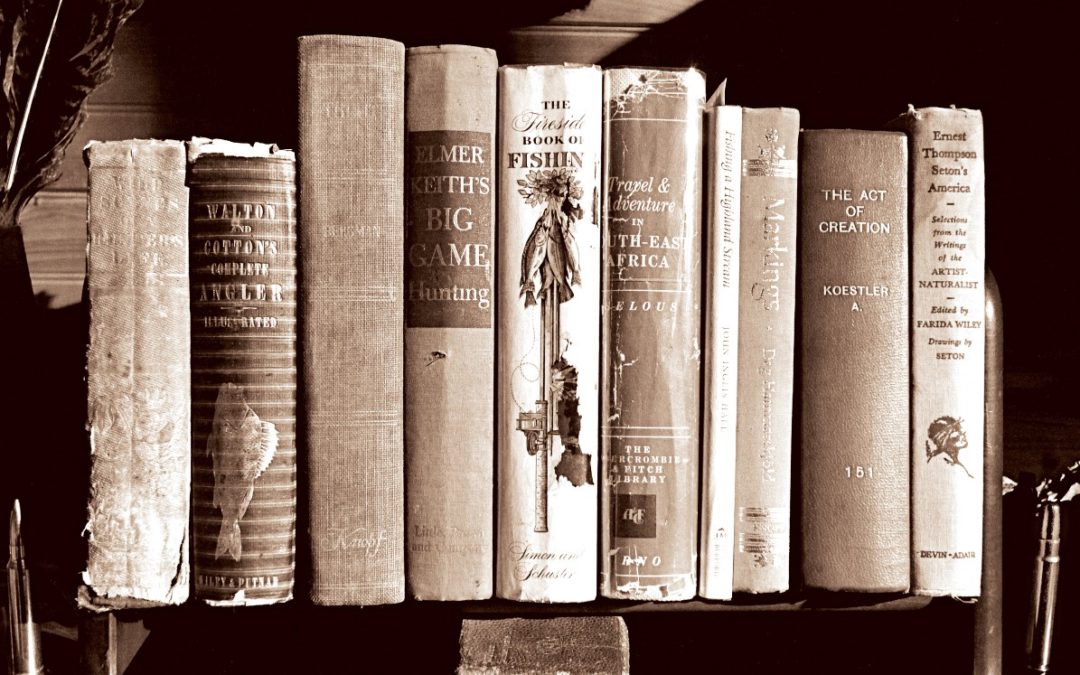I left her alone on James Island in Charleston Harbor this morning for her first year of graduate school and just got home a couple of hours ago.
I am very proud of her. She’s turned into a fine writer and is studying to be a marine biologist and so help save the world, just like she’s wanted to do since she was little and first saw the sea.
And now it’s way past midnight and I miss her terribly, and I can’t seem to get to sleep.
There are neither stars nor moon to light my way for a long wandering walk in the woods. I have a flight out at daylight for New Mexico, and I am bewildered and bemused and alone.
So for the next few hours of my life, I will read.
I intend to read nothing except what I really want to read, and I want to read only what is good. For the night is far too fleeting to waste on anything less.
It might be Beryl Markham or perhaps Isak Dinesen. It might be Isaac Walton or Arthur Koestler, or maybe José Ortega y Gasset or Dylan Thomas. It could be Charles Waterman or Robert Ruark or Nash Buckingham.
But whatever it is, these next few hours will be the best hours of my day.
As they’ve always been.
The first book I remember was a volume of John James Audubon’s Quadrupeds of North America that arrived by mail one grey winter morning when I was four years old while Dad was still at work in the mine. I remember how excited he was when he got home that night, and how, after he had rid himself of the coal dirt and we’d had our supper, he swung me into his lap and opened the book and showed me the myriad wild creatures that lived in a world that until then I thought only contained birds and squirrels and rabbits and deer.
A couple of years later he wrangled me to his side one stormy Friday evening while I was playing cowboy and read me a story by Ernest Thompson Seton about a great grey wolf, and so planted the notion in my young and impressionable mind that words possessed far more power than did my little toy six-gun and mop-handle horse.
A few years later I read for myself a story by Jim Carmichel about how a lion kills, and I gradually realized, “Oh . . . so you can do THAT with words.”
Ever since, the written word has been a mystical and transporting vehicle for me. With it, I have hunted bears and lions and dragons and woodcock. I’ve caught salmon in Alaska and trout in Argentina, climbed mountains in Nepal, walked on the Moon and sailed the solar winds out past Neptune and Pluto.
I have seen the fiery bands of Borealis, felt the bitter winds of a cold Arctic night, rescued damsels, slain trolls, rejoiced in victory, wrestled with fear, and conversed with the likes of Solomon and Socrates and Aeschylus . . . and, yes, even with Mr. Carmichel.
The words of Gordon Lightfoot and Lyle Lovett and Leonard Cohen committed to music have been my faithful companions for years, searing themselves into my psyche just as surely as those of Carl Sandburg and John Steinbeck and William Shakespeare.
I have learned perseverance from the Book of Job, patience from Marcel Proust, truth from the Book of Ecclesiastes, and tenacity from Thomas Hornbein, and was sharing their words with Carly long before she first started shaping sentences for herself.
The notion of Excellence is expressed with no greater effect in the crafting of a fine Purdey gun than it is in the writings of George Bird Evans or Ben Ames Williams, or even Richard Purdey himself. And who is to say that when I am alone on some misty mountain in the Smokies or in the dry desert heat of Utah or in some rain-swollen river in Alaska, that my regard for solitude and contemplation is any greater than it is when I am reading Henry David Thoreau’s Walden or Dag Hammarskjöld’s Markings or Ray Bergman’s Trout? And now I find that sometimes I must pause and think for a moment before I can distinguish reality from metaphor, aspiration from actual experience.
To this day I can’t say with any real certainty which was more enthralling, that sudden encounter I had in my 57th year with the old she-grizzly in Alaska, or the palpitating tremor that accompanied the story of Badlands Billy as he faced down and destroyed the Penroof pack along that narrow ledge in the Dakotas in the story by Mr. Seton that Dad read to me on that fateful Friday night when I was six. For my heart rate was equally elevated with each.
The people I have known, the places I have loved, the birds and animals and fish I have pursued with rod and camera and gun and pen, even the air I have breathed—are these things any more real than those I’ve encountered in the printed pages that have carried me to them and beyond? I know Franz Kafka’s Burrow as well as I know the aspen edges of Sawmill Canyon or the precipitous cliffs that surround Ghost Ranch, and many times I have entered its maze and slept secure in its Castle Keep.
I have sailed the virgin seas with Zane Grey, mended walls with Robert Frost, gone on pilgrimage with John Bunyan and hunted the deep southern forests with William Faulkner. I’ve cast flies on the Traful with Robert McClenagan and Roderick Haig-Brown, fished the Gulf Stream with Ernest Hemingway, and trekked across Africa with Theodore Roosevelt.
And I still don’t understand how.
Just how is it that mere words can fetch us into places of such lyrical grandeur?
How can we be so effectively enthralled by such seemingly abstract combinations of letters and symbols and sounds as to cause us to accept as real that which we know to be only paper and pixels and ink?
Do writers possess such powers of cognition all on their own? Or are they merely the conduits through which these stories and ideas freely flow? I have written some of them myself, and I still don’t have an answer.
And so I am left to wonder if perhaps these thoughts and visions are somehow held in trust by a Higher Power, seeking those here in the material world who may be capable of receiving them or retrieving them—kindred spirits who might be able to understand and experience them and then express their true meaning to others.
All I know for certain is that my body is growing older and my joints are growing stiffer, and the aches of age are becoming less allegorical and more acute.
Nonetheless, I stubbornly continue to go physically to those places and do those things I have loved and dreamed of since childhood.
But I am also resolved to the fact that from time to time I must make my way through this world solely with words.
So tonight I’ll bowhunt lions with Saxton Pope and Arthur Young. I will track man-eaters with Jim Corbett and then hand-line marlin with Santiago.
I’ll climb the Matterhorn with Edward Whymper, stand atop Everest with Tenzing Norgay, see the plains of Patagonia with Charles Darwin, and walk the Road to Emmaus with The Risen Lord.
I’ll go for cape buffalo with Frederick Selous, fish the flats with Flip Pallot, and hunt ruffed grouse along that last lonely road with Corey Ford . . . and still try to get in an hour or so of sleep before my morning flight.
And if I don’t make it all the way to Tinkhamtown by the time the plane lands in New Mexico, it’s really not all that important. After all, I can resume the journey once I get up to the ranch and have dinner and then call Carly to tell her I love her.
For someday—perhaps someday soon—I’ll get there myself.

Enjoy this and many other stories from Michael Altizer’s Nineteen Years to Sunrise. Plus check out the entire collection of outdoors books at sportingclassicsstore.com.

